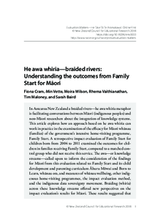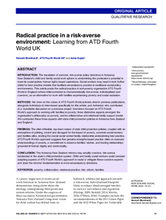Displaying 51 - 60 of 70
This article reports on a mixed methods study that used an ecological approach to understanding variability in child welfare decision-making.
This paper analyzes the perspectives of eleven social workers doing child protection work and examines the accounts of thirteen parents living with mental illness or addiction who have been involved in child custody investigations in Aotearoa New Zealand.
A New Zealand-based "voluntourism" company has announced it will be removing orphanage volunteer trips from its offerings, according to this article from the New Zealand Herald.
The aim of this study was to determine if children identified by a predictive risk model as at “high risk” of maltreatment are also at elevated risk of injury and mortality in early childhood.
This article explores how an approach based on he awa whiria can work in practice in the examination of the efficacy for Māori whānau (families) of the government’s intensive home-visiting programme, Family Start.
This paper argues that assessment of relational quality of applicant foster parents must be a routine component of care practice evaluations, supported by assessment methods capable of distinguishing individual differences on the relational indices of interest.
This book introduces the Relational Learning Framework (RLF), an assessment tool which helps foster care practitioners, social workers and foster carers to examine what foster children have learned in their early life about relationships and particularly through maltreatment.
A United Nations report calls for an independent inquiry into the abuse of children in state care in New Zealand 1950-1990.
Dame Susan Devoy from the Human Rights Commission has appealed to a UN committee to hold an inquiry into child abuse in New Zealand's state institutions between the 1950s and 1990s.
This report examines and shares learnings from ATD Fourth World UK's social work practice framework with families experiencing poverty, discussing its strengths-based collaborative approach to build relationships and reduce power imbalances between practitioners and families. Implications for the feasibility of implementing this framework in child protection social work practice and policy in Aotearoa New Zealand is also addressed.


